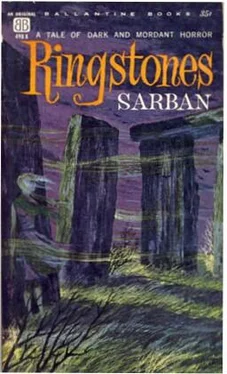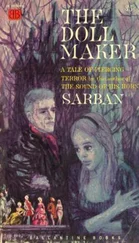Сарбан - Ringstones
Здесь есть возможность читать онлайн «Сарбан - Ringstones» весь текст электронной книги совершенно бесплатно (целиком полную версию без сокращений). В некоторых случаях можно слушать аудио, скачать через торрент в формате fb2 и присутствует краткое содержание. Жанр: Ужасы и Мистика, на английском языке. Описание произведения, (предисловие) а так же отзывы посетителей доступны на портале библиотеки ЛибКат.
- Название:Ringstones
- Автор:
- Жанр:
- Год:неизвестен
- ISBN:нет данных
- Рейтинг книги:3 / 5. Голосов: 1
-
Избранное:Добавить в избранное
- Отзывы:
-
Ваша оценка:
- 60
- 1
- 2
- 3
- 4
- 5
Ringstones: краткое содержание, описание и аннотация
Предлагаем к чтению аннотацию, описание, краткое содержание или предисловие (зависит от того, что написал сам автор книги «Ringstones»). Если вы не нашли необходимую информацию о книге — напишите в комментариях, мы постараемся отыскать её.
Ringstones — читать онлайн бесплатно полную книгу (весь текст) целиком
Ниже представлен текст книги, разбитый по страницам. Система сохранения места последней прочитанной страницы, позволяет с удобством читать онлайн бесплатно книгу «Ringstones», без необходимости каждый раз заново искать на чём Вы остановились. Поставьте закладку, и сможете в любой момент перейти на страницу, на которой закончили чтение.
Интервал:
Закладка:
“Look,” he said. He had paused at a spot I had noticed often before, where a big flat stone buried in the ground made the only break in the level lawn. “Look round from this stone. It is the centre of this level area of the Park and the circumference of the circle is almost exactly a Roman mile. You may run a Roman mile round the Park on even, firm turf.”
I confessed that I had done.
“I have galloped it often when I was a boy,” he said. “Old John Pococke, who planted the Park, left that strip all round the circumference clear of trees as if he intended it for a ride or race−track. Or,” he added, after a pause, cocking his head and looking at me slyly, “or as if he knew it was one.
“Oh no,” he went on, hastily. “I don't say there is any evidence. I'm only too conscious that I look at this place with the eye of faith, which sees what may not be there. If I think I see the turf very slightly depressed in that circuit and if I think I can discern the faint lines of what may be been a retaining bank, I am quite ready to admit that I am deceiving myself and that the chariots have whirled round this arena only in my fancy.”
I remember the sun had now dipped behind Ringstones Moor and we saw the rough hillside where Dr Ravelin pictured the ancient spectators of the games under the shadow of approaching twilight which shed on it a cool gravity of grey−green and blue−grey tones. Still there was a pale golden refulgence above the hill that sent distinct rays, like the spokes of a wheel, branching up into the deepening blue of the sky above our heads; and the tips of the topmost twisted pines on the other hill, behind us, glowed softly still.
Dr Ravelin stared up into the Western sky, at those far−stretching rays, and it was some time before he spoke again.
“But the Romans seem little remoter than our own great−grandfathers when we think by comparison of the eyes that must have watched, with the intentness of a holy purpose, these same rays of sunset or sunrise from this spot where we are standing. This place was holy an unthinkable age before the Romans came. Where we see these rays unterminating, diffusing rather and losing themselves in space and light, those eyes saw each ray tipped with the figure of unending life. An arm of the sun extended to them the holy Ankh. That is not fancy. Or if it is fancy it is one whose antiquity is recorded in stony fact. Perhaps you can't distinguish it now in this light, but look tomorrow morning, you will see on the hillside there a long, sloping line roughly parallel with our drive that comes down from the track across Ringstones Moor. It is the trace of a causeway which led in very ancient times up from this level arena to the moor top; up to the stone circle. There, in that complex of standing stones, are set the altar−stone and sun−stone aligned to look into the eye of the sun when he rises from behind this Eastern moor.”
He talked about megalithic monuments, heliacal rites and a great deal of other learned matters while we sauntered back to the house. He was talking more to himself than to me.
“Guesses, guesses!” he exclaimed suddenly when, having reached the terrace, we turned to look back over the park. “But someone knew. The explanation was here. The road from the stone circle leads back into the park. Something here has laughed at all those priests and laughs still at all our learned arguments.”
He left me with a quick smile and a change of tone: “My fancies may seem strange to you, Miss Hazel, but you might be no stranger among them if they were embodied.”
(6)
In and out among Dr Ravelin's talk of ancient times and foreign lands I threaded the name of Nuaman, but I was never able to pin the Doctor down to a clear statement of who and what he was. Really, I suppose, I did not persist The mere name of his country would probably not have conveyed much to me. It certainly could not have added to my delight in that mingling of gaiety and gravity, wisdom and mischief and those astonishing gifts of physical beauty and agility for which I had begun to love Nuaman. His qualities seemed to have as little to do with the map as they had with the calendar. Just as he could behave like a child one minute and like a mature man the next, so by turns I could fancy him as native English as myself or a Prince from some fairytale country beyond the seas.
Dr Ravelin smiled at this. “Ah, these labels of age and place! They only stick when we grow old. And yet, you know, children are really the ancients among us. It is we, the older people, who bear the stamp of temporariness, the impress of a brief, particular period: we, with our clothes of a particular fashion, our manners dictated by the conventions of our generation, our heads packed full of the prejudices, called information, peculiar to the particular time at which we were educated. We are like a bit of complicated modern machinery, a motor−car or a wireless set. We are the latest thing this year; next year sees one little part modified and our model becomes obsolete. Children are nearer to the essence of life. They are unspecialised humanity. Which of us, do you think, Nuaman or I, would feel sooner at home if we were tomorrow by some freak of time to walk into a gathering of the ancient inhabitants of this valley? It is obvious enough. The complex is ephemeral and at the mercy of the least disturbance. The simple is, broadly speaking, immutable and infused with the quality of duration. What you discern in Nuaman are the qualities of youth, and, at the heart, those qualities move us with the same feeling as does the spectacle of great antiquity. No, as would immortality itself if we could see it embodied. Youth is an attribute of the Gods, and a gleam of godhead shines in every youthful face. You are not so old, Miss Hazel, but that you may confirm that in your own glass.”
I looked in my glass, and saw two blue eyes, moderately bright, and a pair of cheeks a good deal browner than they had ever been before; I looked in the long mirror in the bathroom and saw a figure that caused me no qualms about its fitness. But that did not explain Nuaman. Nor could, or would, Nuaman explain himself.
He was too restless for me ever to keep him in conversation for more than a minute or two at a time, and even then his talk, like his actions, was darting, dancing, bewildering. He wanted speed and spring and wild exertion in everything he did. Neither his cousins nor I could ever go fast enough or keep up a game long enough for him. Sometimes, when I refused to move any more and he reluctantly granted his cousins a respite, he would make Sarkissian bring out the fierce little pony and would ride it bare−backed at a furious gallop round the circular grass drive of the park. He did not even use a halter and the pony's mane was clipped too short for him to grip, but though it bucked and reared and shied nothing could unseat Nuaman once he had gripped with his bare legs. Once, when we were on the hillside, a big ram jumped up, startled, out of a hollow. Nuaman sprang after it, caught it and mounted it. The ram, being half wild, went mad and bolted down the steep slope, clearly bent on suicide. I shrieked helplessly after Nuaman; then, an instant before they reached the rocks where they would both have broken their necks, he rolled off, and the ram, with a swerving bound, missed the precipice and fled along the hill above. It was impossible to scold or control Nuaman. I did not even try. Telling him to be careful would have been as pointless as telling a monkey not to fall out of a tree. In his most daring feats he knew exactly what he was doing. It was obvious, too, that he knew his cousins' abilities as accurately as he knew his own. He exacted from them the very last ounce of energy in every game we played, but never forced them or dared them to do anything that was beyond them.
Читать дальшеИнтервал:
Закладка:
Похожие книги на «Ringstones»
Представляем Вашему вниманию похожие книги на «Ringstones» списком для выбора. Мы отобрали схожую по названию и смыслу литературу в надежде предоставить читателям больше вариантов отыскать новые, интересные, ещё непрочитанные произведения.
Обсуждение, отзывы о книге «Ringstones» и просто собственные мнения читателей. Оставьте ваши комментарии, напишите, что Вы думаете о произведении, его смысле или главных героях. Укажите что конкретно понравилось, а что нет, и почему Вы так считаете.



